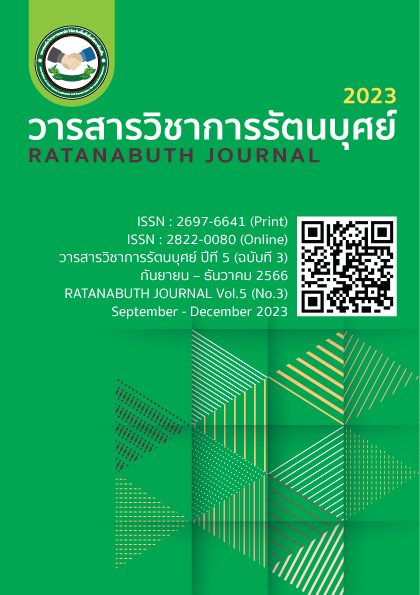The Development of Vocabulary Learning Achievement Using Google Lens and Vocabulary Picture Book (Vocabulary Challenge) within the Environmental of Peer Learning for Grade 4 Students of Anuban Yasothon School The Development of Vocabulary Learning Achievement Using Google Lens and Vocabulary Picture Book (Vocabulary Challenge) within the Environmental of Peer Learning for Grade 4 Students of Anuban Yasothon School
Main Article Content
Abstract
Using picture books makes children more interested in learning, helping students to be enthusiastic and interested in the lesson and able to remember the knowledge contained in the activity by themselves. The objectives of this research are 1) to compare learning achievement in basic English vocabulary between before and after learning of students in Grade 4, 2) to study student satisfaction with the teaching arrangement. and 3) to study the durability of remembering vocabulary after learning by using Google Lens along with a picture book set of Fun Vocabulary Challenge (Vocabulary Challenge) with the format of peer learning activities (Peer Learning) in kindergartens. Yasothon The sample group was 118 students in Grade 4, Classroom 4/1, Yasothon Kindergarten School, academic year 2019, 2020, 2021. The tools used in the research were tests and questionnaires. The statistics used in the analysis are inferential statistics, including the mean and standard deviation. The research results found that Results of the development of English vocabulary learning achievement of Grade 4 students by using Google Lens together with the Vocabulary Challenge picture book with the form of peer-to-peer learning activities. (Peer Learning) Students have higher achievement in vocabulary learning after learning than before learning. They are satisfied with using Google Lens together with the Vocabulary Challenge picture book using the peer learning format. Peer Learning and able to memorize vocabulary even after 2 weeks of study.
Article Details

This work is licensed under a Creative Commons Attribution-NonCommercial-NoDerivatives 4.0 International License.
References
กรมวิชาการ กระทรวงศึกษาธิการ. (2546). การจัดสาระการเรียนรู้กลุ่มสาระภาษาต่างประเทศตามหลักสูตรการศึกษาขั้นพื้นฐาน พุทธศักราช 2544. กรุงเทพฯ: โรงพิมพ์องค์การรับส่งสินค้าและพัสดุ.
จุฬารัตน์ ดวงแก้ว. (2560). ความพึงพอใจของครูต่อภาวะผู้นำทางวิชาการของผู้บริหารสถานศึกษาโรงเรียนมัธยมวัดสิงห์ สังกัดสำนักงานเขตพื้นที่มัธยมศึกษา เขต 1.วิทยานิพนธ์ ศษ.ม. กรุงเทพฯ: มหาวิทยาลัยรามคำแหง.
ชลลดา เรืองฤทธิ์ราวี. (2553). ผลการใช้กลวิธีช่วยจำเพื่อพัฒนาการเรียนรู้คำศัพท์ภาษาอังกฤษของนักเรียนชั้นประถมศึกษาปีที่ 2. การศึกษาค้นคว้าอิสระ กศ.ม. มหาสารคาม: มหาวิทยาลัยมหาสารคาม.
สมุทร เซ็นเชาวนิช.(2551). เทคนิคการอ่านภาษาอังกฤษ. พิมพ์ครั้งที่ 3. กรุงเทพฯ: โรงพิมพ์มหาวิทยาลัยธรรมศาสตร์.
เสาวรี ภูบาลชื่น. (2563). การพัฒนากิจกรรมการเรียนรู้โดยใช้วิธีสอนแบบทางตรงร่วมกับการเรียนรู้แบบร่วมมือเทคนิค STAD เพื่อส่งเสริมความสามารถด้านทักษะปฏิบัติผลสัมฤทธิ์ทางการเรียนและความพึงพอใจวิชาศิลปะสาระนาฏศิลป์ สำหรับนักเรียนชั้นประถมศึกษาปีที่ 6. วารสารมนุษยศาสตร์และสังคมศาสตร์ มหาวิทยาลัยมหาสารคาม, 39(5), 81-92.
Jordan, R. R. (1997). English for academic purpose. A guide and resource book for teachers.
Limbu, P. (2012). Why do we need to use activity-based learning method?. Retrieved from http://eprogressiveportfolio.blogspot.com/2012/06/activity-based-teaching-method.html.
Wilkins, D. A. (1972). Linguistics in Language Teaching. London: Edward Arnold.


